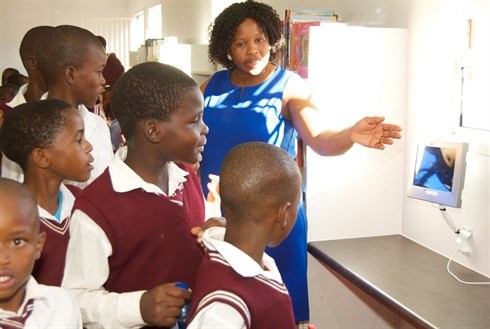
At Sohlazane Primary School in Mpumalanga, Thabantsho Primary School in Limpopo, and Itemeleng Primary in the Free State where the VADEC initiative has been operating, learners have shown a dramatic improvement in school results, and mathematics in particular.
Prior to the VADEC initiative 17% of Grade 6 learners across the three schools were reaching the minimum level required to be promoted to the next grade in mathematics. However, in 2014, after the VADEC had been in place for only six months, 51% attained that level in mathematics. These results were externally measured by the Annual National Assessments(ANA).
In one scenario, 2013 Grade 6 learners were compared to 2014 Grade 6 learners. In a second scenario, the same group of learners at Thabantsho Primary who wrote the Grade 5 ANA in 2013 wrote the Grade 6 ANA in 2014 and they achieved an increase of 22% in their performance.
For the VADEC initiative, Via Afrika upgraded container libraries with 15 Android tablet devices packed with the company's latest ebooks, apps and tools. In addition to this, Via Afrika provided 3G connectivity with 10 GB of data a month. The company believes however that simply supplying the technology is not enough.
According to CEO of Via Afrika, Christina Watson, the success of this initiative rests on what it provides the schools beyond the technology. "Key to the initiative's success was our undertaking to travel to these schools on a regular basis to train staff on how to maximise the educational returns of these tablets for learners and their own teaching.
"CSI initiatives in education can often be based on noble intentions, but without a solid understanding of what is needed to make significant and real change, it will not succeed. We believe that ongoing support and training have to be provided, along with the hardware and software, if a sustainable change is to be seen. Without this understanding, these projects often fail to provide the desired results."
According to independent research group Trialogue, in South Africa, companies spent R8.2 billion on Corporate Social Investment (CSI) projects in 2014 with the lion's share going into education initiatives. Additionally, it found that between 2008 and 2013 there was an increase in the country's overall CSI spend on education, from 31% to 43%.
Corporate South Africa is clearly eager to put its CSI spend into assisting education, but a lack of reporting and accountability make it difficult to ensure that investments bear fruit.
Via Afrika is now stepping into this breach to launch a venture that replicates the VADEC initiative through corporate sponsorship. This new Digital Education Centre (DEC) programme is run by Via Afrika, in partnership with the Department of Basic Education.
"Working together with corporates and the Department of Basic Education, we look forward to reproducing the outstanding success we have seen at Sohlazane, Thabantsho, and Itemeleng primary schools this past year, at other schools across the country," Watson concludes.
For more information, go to www.viaafrika.com.